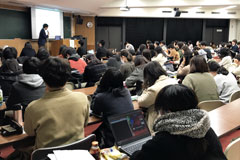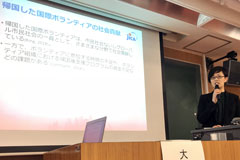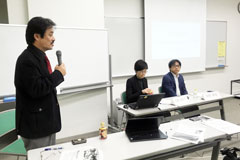The 9th Japan Overseas Cooperation Volunteers (JOCV) Research Seminar: What Are the Positive Effects and the Issues Due to Uniqueness?
2019.02.18
On Jan. 11, 2019, the 9th Japan Overseas Cooperation Volunteers (JOCV) Research Seminar "The Impact of Japan Overseas Cooperation Volunteers on Developing Countries and Japan" was held at Kanazawa University's Kakuma Campus and at Kanazawa Omicho Exchange Plaza in Kanazawa City, Ishikawa, Japan.
JOCV's projects are aimed not only at development cooperation, but also at a variety of other purposes, such as giving back to the community by making use of volunteering experience. That multifaceted nature makes it hard to evaluate activities on a single scale or from a single perspective. Because of this, since 2016, the JICA Research Institute (JICA-RI) has been conducting a research project titled "Contributions of International Volunteers in Bringing Change to Developing Countries and Shaping a Global Civil Society" that examines JOCV activities in the host countries and their social contribution after returning to their home country, Japan. This project is following up the research project conducted from 2011 to 2016, titled "An Interdisciplinary Study of Japan Overseas Cooperation Volunteers (JOCV)." This seminar, convened for the first time in the Hokuriku Region, is one of the activities of the project.
Participants from JICA-RI included Visiting Fellow Yasunobu Okabe, a professor at Tohoku University, Research Fellow Mayuko Onuki, and Eriko Sakamaki, a JICA-RI staff member and former JOCV. In front of 75 members of a group of students from Kanazawa University and the general participants at the Campus venue, Sakamaki took to the stage first to give an overview of the JOCV program and relate her own experiences as a JOCV. Next, Okabe gave a presentation titled "The Developmental Achievements of Japan Overseas Cooperation Volunteers: From the Perspective of Social Capital."

JICA-RI Visiting Fellow Yasunobu Okabe gave a presentation
Social capital (SC) refers to the social network embedded with such resources as funding, services, knowledge, and technology, which can be accessed and utilized to take certain action. Okabe explained that JOCVs’ motives to apply could be categorized into six types: (I) curious; (II) business-minded; (III) development assistance; (IV) quest for oneself; (V) change-oriented; and (VI) altruist. He also presented on JOCVs’ SC formation at their respective host countries as a significant result of their activities. In addition, he said that JOCVs themselves served as the media to form SC, and that they not only strengthened group unity, but also contributed to building networks with other groups. For this reason, he pointed out the "strength of weak specialization" of the JOCVs that enables them to empathize and work with the local people. Okabe gave many examples of activities in which SC had a positive impact, such as Chagas' disease control in Central America.
In relation to that, Koichi Kawai, a senior assistant professor, Faculty of Law, Institute of Human and Social Sciences, Kanazawa University, who served as a commentator at the seminar, sparked discussion by pointing out the need to know the negative effects of SC as well. Okabe responded that there were negative aspects such as the community becoming exclusive if the SC strengthens unity too strong, however, JOCVs presented the significant possibility of contributing to form SC linked to outside parties.
In addition, fellow commentator Aya Okada, an associate professor, Institute of Liberal Arts and Science, Kanazawa University, suggested that intriguing results might be found by analyzing the characteristics of JOCVs who can strengthen SC in connection with the six categorized motives to apply.
Onuki gave a presentation titled "Social Contributions of Former JOCVs: What Type of Former JOCV is Active in Which Volunteer Areas?" In it, Onuki explained that now, 10 years after returning to Japan, the types of former JOCV who embrace new ways of things and seek stimulation continue to contribute to international cooperation without pay. In addition, former JOCVs overall participated more in long-term volunteer activities in the five areas of health, children, community development, the environment and international cooperation than the general public. Onuki also introduced the "2018 State of the World's Volunteerism Report" (SWVR) published by The United Nations Volunteers (UNV) Programme.

JICA-RI Research Fellow Mayuko Onuki presented on her findings on social contributions of former volunteers
In her presentation, Onuki explained that participants in volunteer activities tend to be more outgoing, and that the participation rate of individuals who are high in neuroticism tends to be low. In that regard, a student in the audience asked whether people who were high in neuroticism were unsuited to volunteering. Onuki responded that, rather than interpreting it as being unsuited, there was room to verify, for example, how those characteristics would change through participation through volunteer activities.
At Kanazawa Omicho Exchange Plaza, Okabe and Onuki gave presentations similar to those they gave at Kanazawa University. That was followed by comments from Tomoki Nitta, director general of JICA Hokuriku Center. Nitta emphasized the importance of the achievements of JOCVs, explaining that Okabe's identification of the "strength of weak specialization" played in the formation of SC had to do with the importance of recognizing the limitations of local voluntary action and the importance of cooperation with diverse actors described in the SWVR.

Tomoki Nitta, director general of JICA Hokuriku Center (left) made comments on the presentations given by the participants
A great deal of valuable feedback was received in the Q&A session following the presentations. Discussions involved former JOCVs on the theme of the increasing importance of support for the activities of JOCVs to draw in young Japanese people who have increasingly become inward-looking. The seminar was aired on local TV station MRO, indicating a high interest in the topic.

事業事前評価表(地球規模課題対応国際科学技術協力(SATREPS)).国際協力機構 地球環境部 . 防災第一チーム. 1.案件名.国 名: フィリピン共和国.

事業事前評価表(地球規模課題対応国際科学技術協力(SATREPS)).国際協力機構 地球環境部 . 防災第一チーム. 1.案件名.国 名: フィリピン共和国.

事業事前評価表(地球規模課題対応国際科学技術協力(SATREPS)).国際協力機構 地球環境部 . 防災第一チーム. 1.案件名.国 名: フィリピン共和国.

事業事前評価表(地球規模課題対応国際科学技術協力(SATREPS)).国際協力機構 地球環境部 . 防災第一チーム. 1.案件名.国 名: フィリピン共和国.

事業事前評価表(地球規模課題対応国際科学技術協力(SATREPS)).国際協力機構 地球環境部 . 防災第一チーム. 1.案件名.国 名: フィリピン共和国.
scroll